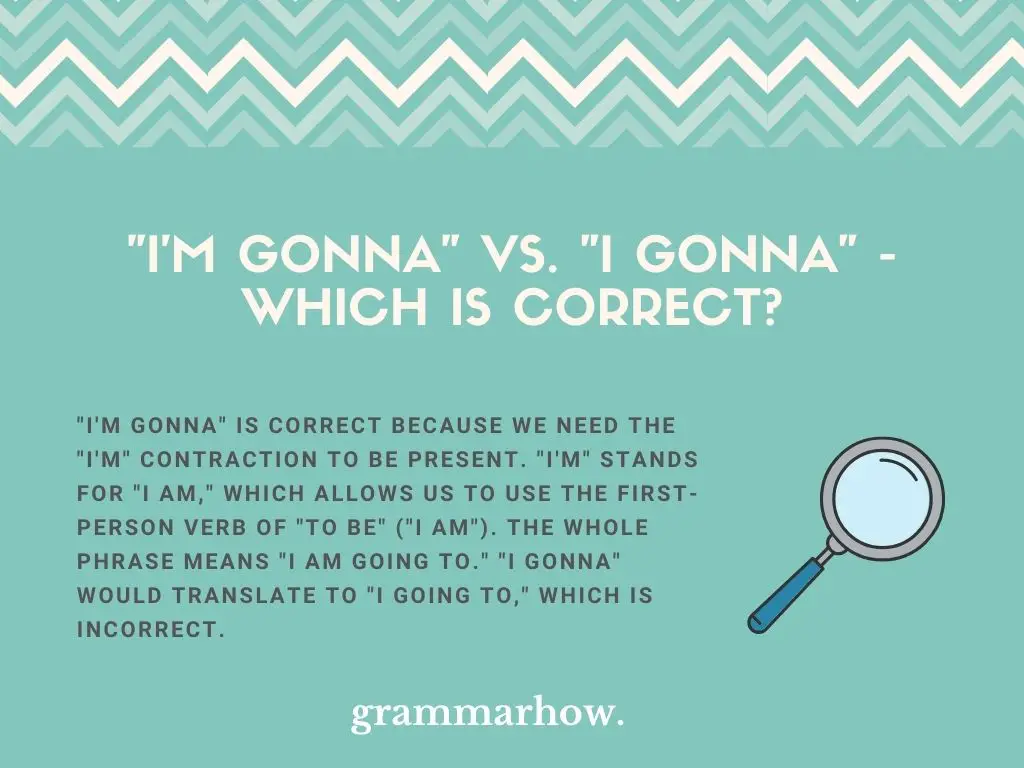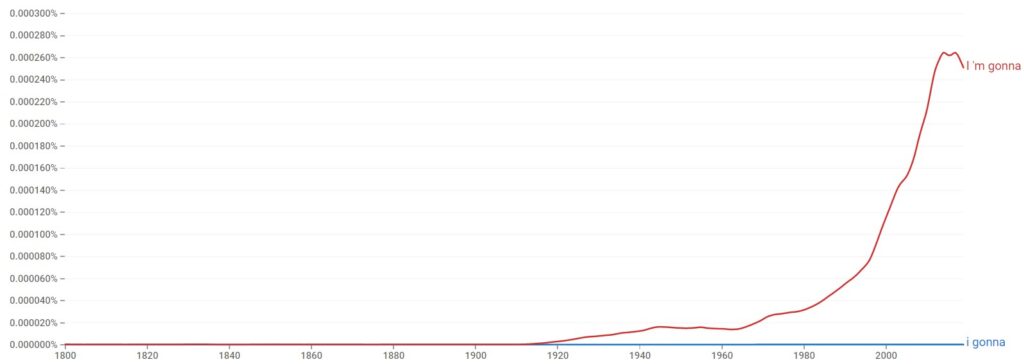“Gonna” is a common shortened form in English. We use it to replace “going to” in spoken English or informal writing. It would help to know how pronouns interact with the phrase. This article will look at whether “I’m gonna” or “I gonna” is correct.
“I’m Gonna” vs. “I Gonna” – Which Is Correct?
“I’m gonna” is correct because we need the “I’m” contraction to be present. “I’m” stands for “I am,” which allows us to use the first-person verb of “to be” (“I am”). The whole phrase means “I am going to.” “I gonna” would translate to “I going to,” which is incorrect.

While “gonna” is clearly an informal phrase, that doesn’t mean it completely ignores language rules. It still needs to stick to the original format that you expect.
Since we’re writing in the first person, we must include the first-person form of “to be,” which is “am.”
The following examples will show you how the original sentence looks and then how the shortened form works:
- Original: I am going to need some help.
- Shortened: I’m gonna need some help.
Is It Ever Correct To Use “I Gonna”?
“I gonna” is never correct, but we don’t want to just tell you that. We want to prove to you that it should never be used.
According to Google Ngram Viewer, “I gonna” is never used, while “I’m gonna” is used plenty of times in English. This shows that it is never correct to use “I gonna.”

Remember, we still have to treat the language structure as you would expect. Therefore, “I gonna” would have to be a short form of “I going to.” Since we cannot use “I” and “going” next to each other without a form of “to be” present, we cannot write it in this form.
It is never correct to use a gerund verb form like “going” directly after a pronoun.
What Does “I’m Gonna” Mean?
“I’m gonna” means “I am going to.” We use it to show that we have a specific intention to complete a task. “Going” doesn’t refer to a specific direction or place we want to go. Instead, we use it to talk about our next action.
It’s common for another verb to follow “I’m gonna” to show what our action might be:
- I’m gonna cry.
- I’m gonna leave.
- I’m gonna need help.
Examples Of How To Use “I Gonna” And “I’m Gonna” In A Sentence
If you’re still not getting the differences between the correct and incorrect form, this section is for you. We’ve split the examples to show you what you should use.
- Correct: I’m gonna need a minute to catch my breath again.
- Incorrect: I gonna want to speak to him again, so you’ll need to make an appointment.
- Correct: I’m gonna find out who did this to you and stop them!
- Incorrect: I gonna need that money back soon! Please don’t forget that!
- Correct: I’m gonna have to be more careful around you now. I don’t know what to expect.
- Incorrect: I gonna want that back! Make sure you give it to me before I have to ask for it.
- Correct: I’m gonna call the police if you provoke me.
- Incorrect: I gonna say goodbye now! I’m really busy today.
As you can see, only the “I’m gonna” examples are marked as correct. There are no exceptions to this rule. You should always use “I’m gonna” when you want to be grammatically correct.
Is It Ever Correct To Use “I Will Gonna”?
“I will gonna” is never correct. If you need to understand why just remember to return “gonna” to the longer form. “I will going to” makes no sense in English, so we cannot use “I will gonna” when we want to talk about something that might occur in the future.
Is It “She Is Gonna” Or “She Gonna”?
The same rules apply no matter what pronoun you use. We still have to include a verb form of “to be” between the pronoun and the gerund form.
“She’s gonna” is correct because we need to use the third-person “to be” form (which is “is”). It is short for “she is going to,” which is grammatically correct. “She gonna” would be short for “she going to,” which is incorrect.
You may also like:
Are “Gonna”, “Wanna”, and “Gotta” Appropriate? (With Statistics)
“Gonna” vs. “Going To” – How To Use The Phrases Correctly
“Going To” vs. “Going To Go” – Difference Explained (With Examples)

Martin holds a Master’s degree in Finance and International Business. He has six years of experience in professional communication with clients, executives, and colleagues. Furthermore, he has teaching experience from Aarhus University. Martin has been featured as an expert in communication and teaching on Forbes and Shopify. Read more about Martin here.
